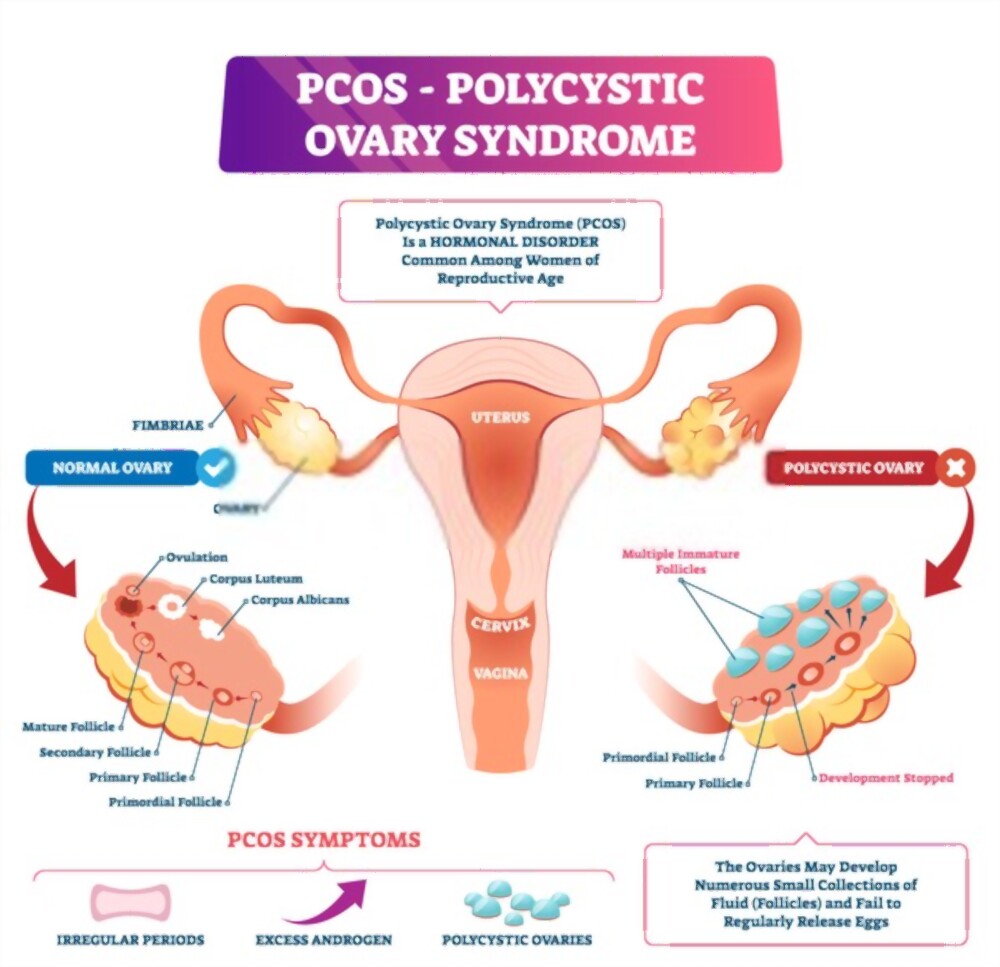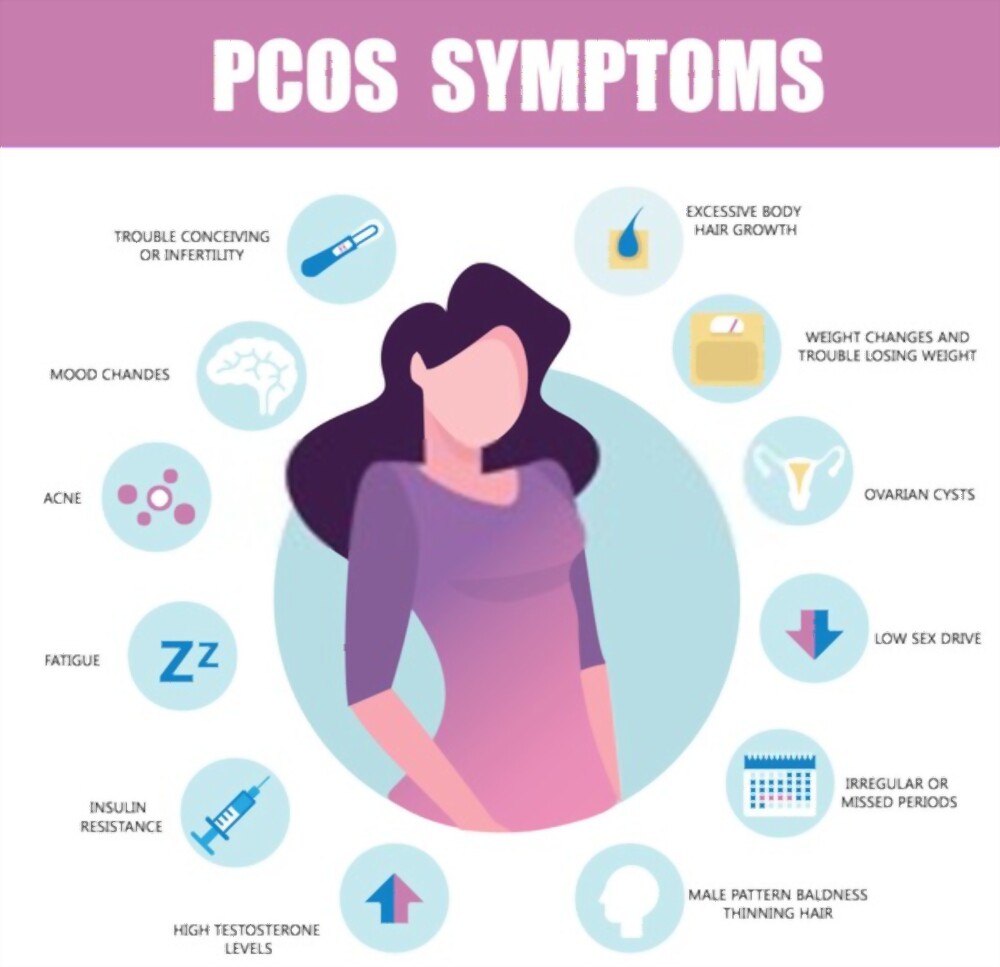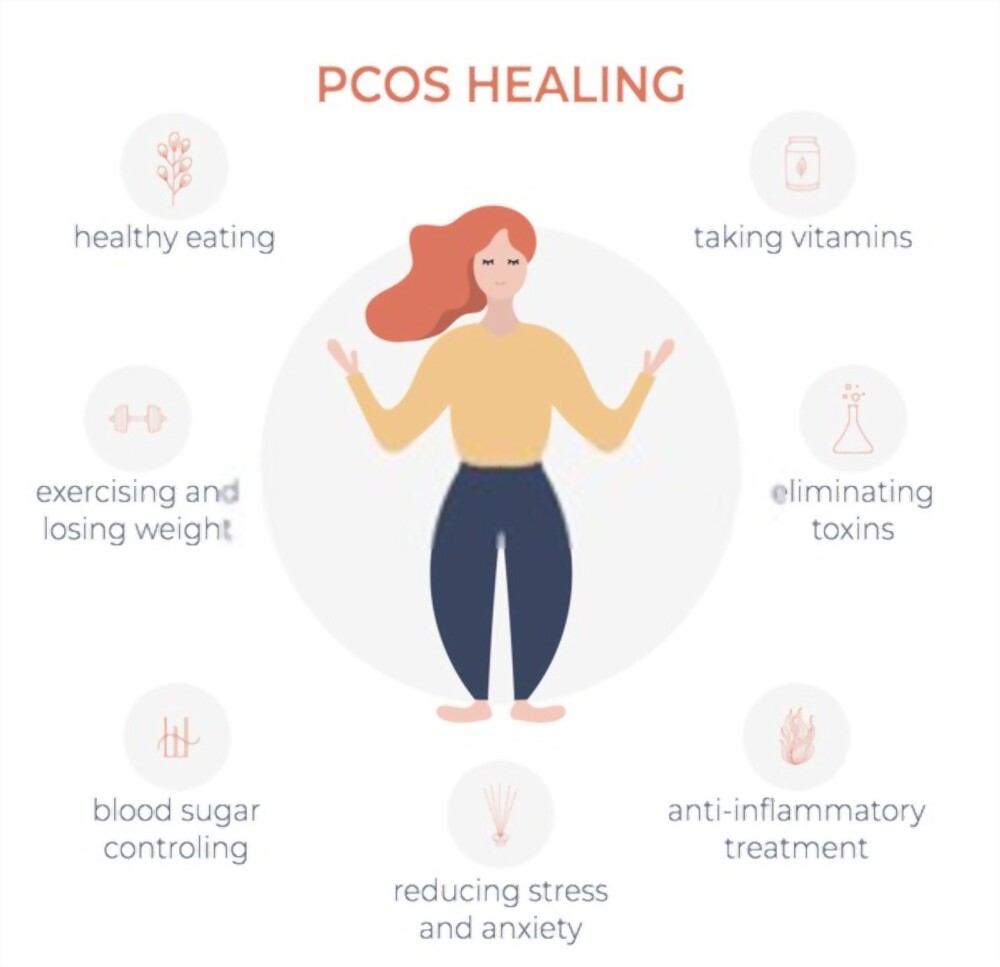PCOS :

The condition polycystic ovary syndrome (PCOS) affects a woman’s hormone levels. Women with PCOS produce more male hormones than normal. This hormonal imbalance causes their bodies to skip menstrual periods, making it more difficult for them to become pregnant.
PCOS also causes facial and body hair growth, as well as baldness. It can also contribute to long-term health issues such as diabetes and heart disease.
Birth control pills and diabetes medications (which combat insulin resistance, a symptom of PCOS) can help correct the hormone imbalance and alleviate symptoms.
Continue reading to learn about the possible causes of PCOS and its effects on a woman’s body.
What exactly is PCOS?

PCOS is a hormonal disorder that affects women during their reproductive years (ages 15 to 44). PCOS affects between 2.2 and 26.7 percent of women in this age group (1, 2Trusted Source).
Many women have PCOS but are unaware of it. According to one study, up to 70% of women with PCOS had not been diagnosed (2Trusted Source).
PCOS affects a woman’s ovaries, which produce estrogen and progesterone — hormones that regulate the menstrual cycle. The ovaries also produce a small number of androgens, which are male hormones.
The ovaries produce eggs, which are fertilized by a man’s sperm. Ovulation is the monthly release of an egg.
Ovulation is controlled by the pituitary gland’s production of follicle-stimulating hormone (FSH) and luteinizing hormone (LH).
FSH stimulates the ovary to produce a follicle — a sac containing an egg — and LH stimulates the ovary to release a mature egg.
PCOS is a “syndrome,” or collection of symptoms affecting the ovaries and ovulation. Its three main characteristics are as follows:
ovarian cysts are a type of cyst that grows in the ovaries.
male hormone levels that are abnormally high
Periods that are irregular or skipped
Many small, fluid-filled sacs grow inside the ovaries in PCOS. The term “polycystic” means “having a lot of cysts.”
These sacs are follicles, each of which contains an immature egg. The eggs never mature sufficiently to cause ovulation.
Ovulation deficiency affects estrogen, progesterone, FSH, and LH levels. Progesterone levels are lower than normal, while androgen levels are higher.
Extra male hormones disrupt the menstrual cycle, resulting in fewer periods for women with PCOS.
PCOS is not a new disease. In 1721, Italian physician Antonio Vallisneri described its symptoms for the first time.
What is the source of it?
Doctors are unsure what causes PCOS. They believe that high levels of male hormones inhibit the ovaries’ ability to produce hormones and produce eggs normally.
Excess androgen production has been linked to genes, insulin resistance, and inflammation.
Genes
According to research, PCOS runs in families.
Many genes, not just one, are likely to play a role in the condition.
Insulin resistance
It affects up to 70% of women with PCOS, which means their cells are unable to use insulin properly.
Insulin is a hormone produced by the pancreas to assist the body in using sugar from foods for energy.
When cells are unable to properly use insulin, the body’s demand for insulin rises. To compensate, the pancreas produces more insulin. Extra insulin stimulates the ovaries to make more male hormones.
Obesity
It is a major contributor to insulin resistance. Obesity and insulin resistance can both increase your risk of developing type 2 diabetes.
Inflammation
Women with PCOS frequently have elevated levels of inflammation in their bodies. Obesity can also contribute to inflammation. Excessive inflammation has been linked to higher androgen levels in studies.
Common PCOS symptoms
Some women experience symptoms around the time they get their first period. Others find they have PCOS after attaining a lot of weight or having trouble getting pregnant.
The following are the most common PCOS symptoms:
Periods that are irregular.
Ovulation failure prevents the uterine lining from shedding every month. Some PCOS women have fewer than eight periods per year or none at all.
There is a lot of blood. Because the uterine lining accumulates for a longer period of time, your periods may be heavier than usual.
Hair growth.
Hair growth Over 70% of women with this condition develop hair on their face and body, including their back, belly, and chest. Hirsutism is a condition characterized by excessive hair growth.
Acne.
Male hormones can cause the skin to become oilier than usual, resulting in breakouts on areas such as the face, chest, and upper back.
Gaining weight.
Up to 80% of women with PCOS are overweight or obese.
Male-pattern baldness.
Male pattern baldness is a type of baldness that occurs in men. The hair on the scalp thins and may fall out.
Skin discoloration.
Dark patches of skin can develop in body creases such as those on the neck, groin, and under the breasts.
Headaches.
Hormonal changes can cause headaches in some women.
The Effects of PCOS on Your Body

Higher-than-normal androgen levels can have an impact on your fertility as well as other aspects of your health.
Infertility
You must ovulate in order to become pregnant. Women who do not ovulate on a regular basis do not produce as many eggs to be fertilized. PCOS is one of the leading and foremost causes of female infertility.
Metabolic Syndrome
Up to 80% of women with PCOS are overweight or obese. PCOS and Obesity both increase your chances of:
high blood sugar levels
blood pressure is too high
a lack of “good” HDL cholesterol
a high level of “bad” LDL cholesterol
These factors are referred to collectively as metabolic syndrome, and they increase the risk of:
coronary heart disease
diabetes
stroke
Sleep apnea
This condition causes repeated pauses in breathing during the night, disturbing sleep.
It is more common in overweight women, especially if they also have PCOS. Women who have both PCOS and obesity tend to have a 5 to 10 times higher risk of sleep apnea than those who do not have PCOS.
Endometrial cancer
It is the most common type of cancer in women.
The uterine lining sheds during ovulation. If you don’t ovulate every month, the lining can become clogged.
Endometrial cancer risk is increased by a thickened uterine lining.
Depression
Both hormonal changes and symptoms such as unwanted hair growth can have a negative impact on your emotions. Many people with PCOS eventually develop depression and anxiety.
How is PCOS diagnosed?
PCOS is typically diagnosed in women who have at least two of these three symptoms (17Reliable Source):
high levels of androgen
menstrual cycles that are irregular
ovarian cysts are a type of cyst that grows in the ovaries.
Your doctor should also inquire as to whether you have experienced any symptoms such as acne, facial and body hair growth, or weight gain.
A pelvic exam can detect any issues with your ovaries or other reproductive tract parts. During this test, your doctor inserts gloved fingers into your vagina and examine your ovaries and uterus for any growths.
Male hormone levels that are higher than normal are detected in blood tests.
You may also be given blood tests to check your cholesterol, insulin, and triglyceride levels in order to assess your risk for conditions such as heart disease and diabetes.
An ultrasound examines your ovaries and uterus using sound waves to look for abnormal follicles and other problems.
PCOS and pregnancy
PCOS disrupts the normal menstrual cycle, making it more difficult to conceive. Fertility issues affect 70 to 80 percent of PCOS women (18Trusted Source).
This condition can also increase the chances of complications during pregnancy.
Women with PCOS are twice as likely as women who do not have the condition to have a premature baby. They are also more likely to miscarry, have high blood pressure, and develop gestational diabetes (19).
Women with PCOS, on the other hand, can become pregnant using fertility treatments that improve ovulation. Losing weight and lowering blood sugar levels can help you have a healthier pregnancy.
PCOS Diet and lifestyle recommendations

PCOS treatment typically begins with lifestyle changes such as weight loss, diet, and exercise.
Losing just 5 to 10% of your body weight can help manage your menstrual cycle and relieve PCOS symptoms. Weight loss can also lead to:
raise cholesterol levels
lower insulin levels
lessen the chances and risks of diabetes and heart disease
Any diet that aids in weight loss can benefit your condition. Some diets, however, may have advantages over others.
Low carbohydrate diets are effective for both weight loss and lowering insulin levels, according to studies comparing PCOS diets.
A low glycemic index (low GI) diet rich in fruits, vegetables, and whole grains helps regulate the menstrual cycle better than a standard weight loss diet.
Moreover, several studies have found that 30 minutes of moderate-intensity exercise three times per week can help women with PCOS lose weight. Exercising to lose weight improves ovulation and insulin levels.
When combined with a healthy diet, exercise is even more beneficial. Diet and exercise together with help you lose more weight than either intervention alone, and it lowers your risk of diabetes and heart disease.
Acupuncture has some proof that it can help with PCOS, but more research is required.
Summary
PCOS treatment begins with changes to one’s lifestyle, such as diet and exercise. If you are overweight, losing just 5 to 10% of your body weight can help improve your symptoms. Medical treatments that are commonly used
Birth control pills and other medications
This can aid in the regulation of the menstrual cycle and the treatment of PCOS symptoms such as hair growth and acne.
Contraception
Taking progestin on a daily basis can cause:
reestablish a normal hormonal balance
control ovulation
alleviate symptoms such as excessive hair growth
Endometrial cancer prevention
These Hormones can be taken as a tablet, a patch, or a vaginal ring.
Metformin
Metformin (Glucophage, Fortamet) is a diabetes medicine used to treat type 2 diabetes. It also aids in the treatment of PCOS by raising insulin levels.
Metformin, when combined with dietary and activity adjustments, promotes weight reduction, reduces blood sugar, and restores a normal menstrual cycle more effectively than dietary and exercise changes alone, according to one study.
Clomiphene
Clomiphene (Clomid) is a fertility medication that can assist women with PCOS in becoming pregnant.
It’s important to remember that clomiphene increases the chances of twins and other multiple births when discussing family planning.
Hair-removal medication
A few treatments can help you get rid of unwanted hair or stop it from sprouting in the first place.
Eflornithine cream (Vaniqa) is a prescription hair-slowing treatment. Laser hair removal or electrolysis can be used to eliminate unwanted hair from your face and body.
Surgery
Surgery may be an option if other therapies fail to enhance fertility. Ovarian drilling is a technique that involves making microscopic holes in the ovary using a laser or a thin heated needle in order to reestablish regular ovulation.
Summary
Birth control pills and the diabetes medication metformin can both help restore a normal menstrual cycle. Clomiphene and surgery improve fertility in PCOS women. Women can also benefit from hair removal medications to help them get rid of unwanted hair. When should you see a doctor?
If you’re having any of the following symptoms, see your doctor:
You’ve missed a few periods and aren’t pregnant.
You have PCOS symptoms such as facial and body hair growth.
You’ve been trying to get pregnant for over a year but haven’t had any luck.
You are experiencing diabetes symptoms such as excessive thirst or hunger, blurred vision, or unexplained weight loss.
If your periods are already irregular or absent and you’re trying to conceive, don’t wait another year to see a specialist.
Also, keep in mind that if you don’t want to get pregnant, irregular or absent periods aren’t enough to prevent pregnancy.
Even under these circumstances, it is possible to become pregnant. Even if you have PCOS, it is best to use contraception in this situation.
If you have PCOS, schedule regular visits with your primary care physician. You’ll need to have regular blood tests to rule out diabetes, high blood pressure, and other potential complications.
Summary
Consult your doctor if your period has skipped or if you have other PCOS symptoms such as hair growth on your face or body. Consult a doctor if you’ve been trying to conceive for 12 months or more without success. Conclusion
The bottom line is that PCOS can disrupt a woman’s menstrual cycles and make it difficult to conceive. Unwanted symptoms such as hair growth on the face and body are also caused by high levels of male hormones.
Doctors frequently recommend lifestyle modifications as the first treatment for PCOS, and they are often helpful.
Weight loss can help treat PCOS symptoms and increase your chances of getting pregnant. Diet and aerobic exercise are two effective weight-loss methods.
If lifestyle changes do not work, medications are an option. Metformin and birth control pills can both restore more normal menstrual cycles and alleviate PCOS symptoms.
Also Read : Suicide- A Curse To Society- Know How to Prevent It – V Cure (vcurehealthcare.com)





